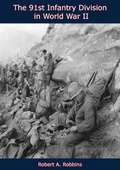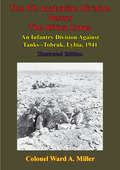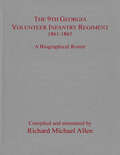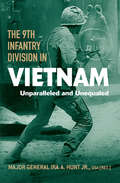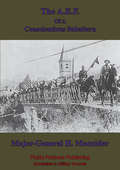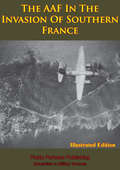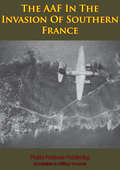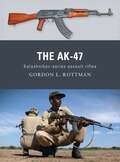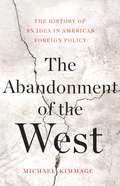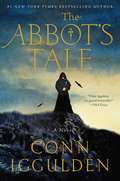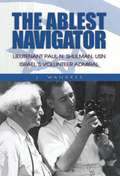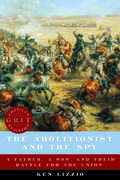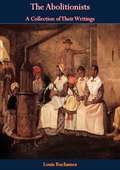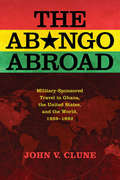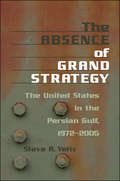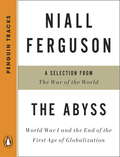- Table View
- List View
The 9/11 Terrorist Attacks (A Day That Changed America)
by Amy MaranvilleOn September 11, 2001, an entire country ground to a halt as terrorists attacked the World Trade Center in New York City, the U.S. Pentagon in Washington D.C., and crashed an airliner near Shanksville, Pennsylvania. Now readers can step back in time to learn what led up to the 9/11 terrorist attacks, how the tragic events unfolded, and the ways in which one devastating day changed America forever.
The 9/11 Wars
by Jason BurkeDAILY TELEGRAPH, ECONOMIST AND INDEPENDENT BOOKS OF THE YEARThroughout the 1990s a vast conflict was brewing. The storm broke on September 11th 2001. Since then much of the world has seen invasions, bombings, battles and riots. Hundreds of thousands of people have died. Jason Burke, a first-hand witness of many of the conflict's key moments, has written the definitive account of its course in his acclaimed book The 9/11 Wars.At once investigation, reportage and contemporary history, The 9/11 Wars is an essential book for understanding the dangerous and unstable twenty-first century. Whether reporting on the riots in France or the attack on Mumbai, suicide bombers in Iraq or British troops fighting in Helmand, Jason Burke tells the story of a world that changed forever when the hijacked planes flew out of the brilliant blue sky above Manhattan on September 11th.Reviews:'The best overview of the 9/11 decade so far in print' Economist'A magisterial history of the last decade ... The long patient sentences of The 9/11 Wars are suffused with the melancholy of a man who has learned a great deal from long exposure to atrocity and folly' Pankaj Mishra, Guardian'The 9/11 Wars warrants great respect' Metro'Pacy, well-researched, and packed with telling anecdotes, this book's strength is in its detailed, balanced overview ... At a time when there are more books out on terrorism than ever before ... this is likely to be among the best' Sunday Telegraph'[Burke] is one of the most respected and experienced foreign correspondents in the business ... A major authority on the politics and organisation of Islamic extremism and ... a talented writer with the rare gift of joining effortless prose to challenging scholarship ... [The 9/11 Wars] is a magnificent achievement' Irish Times'A reader wanting a more dispassionate survey of how 9/11, and the response to it, may have shaped parts of the world will do no better than invest in [this] brilliant book' David Aaronovitch, The Times'This remarkably balanced, well-sourced and very well-written book ... will be turned to in the future ... [Burke] has demonstrated impressive expertise as a historian who has had the advantage of having been present on many of the battlefields he describes' Andrew Roberts, Evening Standard'[A] lucid, sane account ... taut, careful reporting ... Remarkable' Scotsman'Potent ... journalism of a high order. Like all good reporters, Burke is something of a scholar, drawing meticulously on interview notes years old, and on extensive background reading. He excels, too, in describing the experiences of ordinary Muslims; such insights make this book essential for understanding the past decade' Sunday TimesAbout the author:Jason Burke is the South Asia correspondent for the Guardian. He has reported around the world for both the Guardian and the Observer. He is the author of two other widely praised books, both published by Penguin: Al-Qaeda and On the Road to Kandahar. He lives in New Delhi.
The 91st Infantry Division in World War II (Divisional Ser. #Vol. 49)
by Robert A. RobbinsOriginally published in 1947 by Infantry Journal Press, this is the official unit history for the 91st Infantry Division in World War II. The 91st Infantry Division arrived in North Africa, 18 April to 10 May 1944, and trained intensively at Arzew and Renan, French Morocco. Leaving by units, the entire Division was in Italy, 19 June 1944. Meanwhile, the 361st RCT landed at Anzio, 1 June, and fought near Velletri south of Rome from 3 June. The 363d RCT entered combat near Riparbella, 4 July. On 12 July, the Division fought as a unit near Chianni, Italy, for the high ground dominating the Arno River. By the 19th it had reached the river. The 363d RCT participated in the capture of Livorno, 19 July, and in a quick thrust to the north, two units entered Pisa, 24 July. From 24 July to 12 September 1944, the 91st held their positions along the Arno while they underwent extensive training. On the 13th, the Division attacked the Gothic Line, took Monticelli, 18 September, and advanced to the Santerno River through stubborn resistance, 23 September. Moving through rocky escarpments and other natural barriers as well as heavy opposition, the 91st occupied Livergnano, 13 October. The offensive was canceled, however, and the 91st assumed defensive positions below Pianoro, 31 October. During November, the 91st remained on the defensive, sending out small patrols. After resting in December, the Division returned to the line and maintained a static defensive front until 20 March 1945, when the Division retired to Gagliano and Villanova to prepare for a new offensive. This final assault began on 15 April 1945. The 91st entered Bologna, 21 April, and moved along Highway No. 64 against slight resistance. After crossing the Po River on the 23d, the Division swung to the northeast, crossing the Adige River, 26 April, and reaching. Treviso on the 29th. All enemy forces in Italy surrendered, 2 May... General Nickname: Powder River Division. Slogan: Always Ready—Print ed.
The 9th Australian Division Versus The Africa Corps: [Illustrated Edition]
by Colonel Ward MillerIllustrated with 7 maps and 15 photosIn April and May 1941, the previously successful blitzkrieg tactics of the German Army met defeat by the outnumbered Australian forces of the 9th Division at Tobruk. The Australian infantry achieved victory through a successful all-around defense against tank attacks in force. By employing all available assets in a combined arms effort, well-supported light infantry forces defeated a heavier armored force.The 9th Australian Division Versus the Africa Corps: An Infantry Division Against Tanks-Tobruk, Libya, 1941 provides the reader with a valuable historical context for evaluating how light infantry forces can confront armored attacks. This CSI special study also reveals how light infantry forces operated and were supported and sustained in a desert environment-a message that has continuing relevance for today's Army.
The 9th Georgia Volunteer Infantry Regiment 1861–1865: A Biographical Roster
by Richard Michael AllenThe 7th, 8th, 9th, and 11th Georgia volunteer infantry regiments spent most of the Civil War fighting under Brig. Gen. George Thomas “Tige” Anderson in Gen. Robert E. Lee’s Army of Northern Virginia. Until now, no biographical roster of their members has ever been published. These Georgians saw it all, from the bloody battle of First Manassas through the ferocious combat of Second Manassas, Sharpsburg, Gettysburg, the Wilderness, Spotsylvania, and the long siege of Petersburg. They finally furled their banners at Appomattox. Nearly 5,000 men passed through these four Georgia regiments. These rosters offer a long overdue record of these men. Each roster is organized by company in a simple and easy to use format. Entries feature full names (if known), promotions, demotions, casualties, transfers, and resignations for every rank—an unprecedented look into men and the structure and evolution of these organizations. They include the most comprehensive examination of the personnel originally enlisted and their subsequent service histories within these units in chronological order for the first time. Compiler and author Richard Allen has spent nearly two decades researching scores of archives and other sources to prepare these rosters. He utilized primary sources such as the Official Records, Compiled Service Records, newspaper accounts, diaries, letters, census information, burial records, and a variety of documents from both published sources and private collections. Students of the Civil War, genealogists, and enthusiasts of Georgia history will find these rosters invaluable. Everyone who uses them owes Rick Allen a hearty, and heartfelt, thank you.
The 9th Infantry Division in Vietnam: Unparalleled and Unequaled (American Warriors Series)
by Major General Ira A. Hunt Jr.&“This outstanding book is a must read for those trying to understand the Vietnam War and its guerrilla warfare tactics&”—from the author of Losing Vietnam (Post Library). Of all the military assignments in Vietnam, perhaps none was more challenging than the defense of the Mekong River Delta region. Operating deep within the Viet Cong-controlled Delta, the 9th Infantry Division of the U.S. Army was charged with protecting the area and its population against Communist insurgents and ensuring the success of the South Vietnamese government&’s pacification program. Faced with unrelenting physical hardships, a tenacious enemy, and the region&’s rugged terrain, the 9th Division established strategies and quantifiable goals for completing their mission, effectively writing a blueprint for combating guerilla warfare that influenced army tacticians for decades to come. In The 9th Infantry Division in Vietnam, Ira A. Hunt Jr. details the innovative strategies of the 9th Division in their fight to overcome the Viet Cong. Based on Hunt&’s experience as colonel and division chief of staff, the volume documents how the 9th Division&’s combat effectiveness peaked in 1969. A wealth of illustrative material, including photos, maps, charts, and tables, deepens understanding of the region&’s hazardous environment and clarifies the circumstances of the division&’s failures and successes. A welcome addition to scholarship on the Vietnam War, The 9th Infantry Division in Vietnam will find an audience with enthusiasts and scholars of military history. &“General Hunt set about proving that the claims of the 9th Infantry Division&’s brilliant performance in Vietnam were founded on fact. He succeeded and far more.&”—Jack N. Merritt, General, U.S. Army, Retired
The A.E.F. Of A Conscientious Subaltern [Illustrated Edition]
by Major-General Hanford MacniderA Short but very valuable memoir from a future General of the American Army who faced his first baptism of first in the trenches of the First World War. Includes a number of sketches of the men with whom he served and the frontline."Memoir, 1917-1918. MacNider was a lieutenant in the 9th Infantry Regiment, 2nd Division. This short memoir provides vignettes of fighting near Soissons and St. Mihiel."- p. 232, Edward Lengel, World War I Memories, 2004, The Scarecrow Press, Lanham Maryland, Toronto, Oxford.
The AAF In Northwest Africa [Illustrated Edition] (Wings At War #6)
by AnonThe AAF in Northwest Africa focuses on the Allied assault on Northwest Africa and the battle for Tunisia-the critical second front that secured the Mediterranean and increased the enemy's vulnerability to a massive invasion from Britain. From this experience of the Twelfth Air Force and its British counterparts in 1942-43 evolved a spirit of Anglo-American cooperation and important aspects of air doctrine still relevant to today's Air Force.Originally published shortly after key air campaigns, the Wings at War series captures the spirit and tone of America's World War II experience. Eyewitness accounts of Army Air Forces' aviators and details from the official histories enliven the story behind each of six important AAF operations.
The AAF In The Invasion Of Southern France [Illustrated Edition] (Wings At War #1)
by AnonIllustrated with 6 maps and 11 Illustrations.The AAF in the Invasion of Southern France tells how the Mediterranean Allied Air Forces, under the command of Lt. Gen. Ira Eaker, supported the Allied airborne and amphibious assault designed to undercut German defenses in Occupied France. In this invasion-the fourth major one in three months-American air power overwhelmed the meager enemy forces and diverted attention from the north, helping to topple German control in Vichy. Air operations persistently found, fixed, and fought occupying German forces, preventing their orderly withdrawal, greatly easing the way for Allied invasion forces.Originally published shortly after key air campaigns, the Wings at War series captures the spirit and tone of America's World War II experience. Eyewitness accounts of Army Air Forces' aviators and details from the official histories enliven the story behind each of six important AAF operations.
The AI Wave in Defence Innovation: Assessing Military Artificial Intelligence Strategies, Capabilities, and Trajectories
by Michael RaskaAn international and interdisciplinary perspective on the adoption and governance of artificial intelligence (AI) and machine learning (ML) in defence and military innovation by major and middle powers. Advancements in AI and ML pose pressing questions related to evolving conceptions of military power, compliance with international humanitarian law, peace promotion, strategic stability, arms control, future operational environments, and technology races. To navigate the breadth of this AI and international security agenda, the contributors to this book include experts on AI, technology governance, and defence innovation to assess military AI strategic perspectives from major and middle AI powers alike. These include views of how the United States, China, Japan, South Korea, the European Union, and Russia see AI/ML as a technology with the potential to reshape military affairs and power structures in the broader international system. This diverse set of views aims to help elucidate key similarities and differences between AI powers in the evolving strategic context. A valuable read for scholars of security studies, public policy, and STS studies with an interest in the impacts of AI and ML technologies.
The AK-47
by Gordon Rottman Johnny ShumateThe Kalashnikov AK-47 is the most ubiquitous assault rifle in the world, with more AK-47s and its variants in use than any other individual small arm. Created by Senior Sergeant Mikhail Kalashnikov, and first adopted by the USSR soon after World War II, its production continues to this day, with an estimated 75 million produced worldwide. It is the longest serving post-World War II military weapon and its ease of use, durability and low production costs ensure that it's use will continue for generations to come. This book takes a look at the complete history of the weapon, discussing its design, development, and usage, taking its story from the great armies of the Soviet Union to the insurgents and criminal gangs that often employ the weapon today.From the Trade Paperback edition.
The ASVAB (Test Easy)
by Laura Stradley Robin KavanaghRest Easy with Test Easy!You're excited about your decision to join the U.S. Armed Forces, and you know that your ASVAB scores will determine the course of your military career, so you want to do your absolute best. Well, rest easy because Test Easy makes acing your exam a snap! In this book, you get:A quick assessment to see where you need the most helpStudy strategies to help you do your very bestMath and Science tutorials to get you ready for the Arithmetic Reasoning, Mathematics Knowledge, and General Science categoriesCommunication tutorials to get you ready for the Paragraph Comprehension and Word Knowledge categoriesTechnical tutorials to get you ready for the Assembling Objects, Auto & Shop, Electronics, and Mechanical Comprehension categories3 full Armed Services Vocational Battery (ASVAB) practice tests1 full practice Armed Forces Qualifying Test (AFQT)Specific tips to get you ready for each of the 9 categories
The Abandonment of the West: The History of an Idea in American Foreign Policy
by Michael KimmageThis definitive portrait of American diplomacy reveals how the concept of the West drove twentieth-century foreign policy, how it fell from favor, and why it is worth saving.Throughout the twentieth century, many Americans saw themselves as part of Western civilization, and Western ideals of liberty and self-government guided American diplomacy. But today, other ideas fill this role: on one side, a technocratic "liberal international order," and on the other, the illiberal nationalism of "America First."In The Abandonment of the West, historian Michael Kimmage shows how the West became the dominant idea in US foreign policy in the first half of the twentieth century -- and how that consensus has unraveled. We must revive the West, he argues, to counter authoritarian challenges from Russia and China. This is an urgent portrait of modern America's complicated origins, its emergence as a superpower, and the crossroads at which it now stands.
The Abbot's Tale: A Novel
by Conn IgguldenFrom New York Times bestselling Conn Iggulden comes a new novel set in the red-blooded days of Anglo-Saxon England. This is the original game for the English throne. In the year 937, the new king of England, a grandson of Alfred the Great, readies himself to go to war in the north. His dream of a united kingdom of all England will stand or fall on one field—on the passage of a single day. At his side is the priest Dunstan of Glastonbury, full of ambition and wit (perhaps enough to damn his soul). His talents will take him from the villages of Wessex to the royal court, to the hills of Rome—from exile to exaltation. Through Dunstan's vision, by his guiding hand, England will either come together as one great country or fall back into anarchy and misrule . . . From one of our finest historical writers, The Abbott’s Tale is an intimate portrait of a priest and performer, a visionary, a traitor and confessor to kings—the man who can change the fate of England.
The Ablest Navigator
by J. WandresThis action-packed biography focuses on a 1944 graduate of the U.S. Naval Academy who was one of only fifty Jewish midshipmen commissioned in his class during World War II. In the Pacific, Lt. Shulman s destroyer survived both a typhoon and a Japanese kamikaze aircraft attack. After leaving the U.S. Navy and returning to civilian life, he volunteered to help the Haganah, the paramilitary force of the Jewish Agency for Palestine headed by David Ben-Gurion. Shulman had been introduced to Ben-Gurion by his mother, who was an executive with Hadassah, the Women's Zionist Organization of America. Working in New York City, he helped to buy surplus warships for the Haganah s clandestine sealift that brought Holocaust survivors from Europe to Palestine.In early 1948 Ben-Gurion called the 25-year-old Shulman to Israel to set up an academy to train officers and NCOs to man ships of Israel s fledgling navy, which at that point only had the refugee vessels. Beginning with almost no assets, within three months, now-Kvarnit (Commander) Shulman took the Israeli squadron into action against enemy ships, and even against one vessel fighting with Israeli forces. After Israel won its independence most of the 1,200 American and Canadian volunteers went home. Shulman, with his wife and infant son, remained in Israel, settling in Haifa, which would be their home for the next forty years. After Shulman died in 1994, a stained glass window was dedicated in his memory at the U.S. naval Academy s new Uriah P. Levy Chapel.Wandres book fully documents Shulman s role in helping to launch the navy of new Israeli nation. Based on interviews and correspondence with former U.S. Navy shipmates and Machal volunteers, Israeli and American archives, and declassified Secret U.S. Department of State documents, The Ablest Navigator provides a unique window into Israel s history and its relations with the United StatesThis narrative biography relies on interviews and correspondence with former U.S. Navy shipmates and Machal volunteers, Israeli and American archives, and declassified Secret U.S. Department of State documents.
The Abolitionist and the Spy: A Father, A Son, And Their Battle For The Union
by Ken LizzioAn abolitionist and a spy, father and son, in the forgotten Western theater of the Civil War The abolitionist legacies of Orville Brown and his son, Spencer, live on in this historic and daring 19th-century account. Journeying apart from each other, but with similar passion, Orville and Spencer’s stories span virtually every major abolitionist event: from the battles of Bleeding Kansas and the establishment of the free-soil movement to the river wars of Memphis, Vicksburg, and Shiloh. Readers will follow Orville west as he struck out for Kansas Territory to help ensure its entry as a free state. But the life of his precocious eldest son, Spencer, serves as an eventful accompaniment to Orville’s own adventures. As a young Navy recruit in the Civil War’s Western theater, Spencer volunteered to go behind enemy lines on numerous occasions. With his bold sleuthing and detailed diaries, Spencer’s life unfolds vividly against the exciting backdrop of the Union and Confederate battle for control of the Mississippi River. The lives of these daring men are a fortifying record of American perseverance.
The Abolitionists: A Collection of Their Writings
by Louis Ruchames"Forceful, inflammatory writings on slavery by many authors to present a comprehensive view of the Abolitionist movement, the most powerful force in the framing of the Northern anti-slavery attitude before the Civil War."-Print ed.
The Abongo Abroad: Military-Sponsored Travel in Ghana, the United States, and the World, 1959-1992 (Cold War in Global Perspective)
by John V. CluneBlending African social history with US foreign relations, John V. Clune documents how ordinary people experienced a major aspect of Cold War diplomacy. The book describes how military-sponsored international travel, especially military training abroad and United Nations peacekeeping deployments in the Sinai and Lebanon, altered Ghanaian service members and their families during the three decades after independence in 1957. Military assistance to Ghana included sponsoring training and education in the United States, and American policymakers imagined that national modernization would result from the personal relationships Ghanaian service members and their families would forge. As an act of faith, American military assistance policy with Ghana remained remarkably consistent despite little evidence that military education and training in the United States produced any measurable results.Merging newly discovered documents from Ghana's armed forces and declassified sources on American military assistance to Africa, this work argues that military-sponsored travel made individual Ghanaians' outlooks on the world more international, just as military assistance planners hoped they would, but the Ghanaian state struggled to turn that new identity into political or economic progress.
The Abongo Abroad: Military-Sponsored Travel in Ghana, the United States, and the World, 1959-1992 (Cold War in Global Perspective)
by John V. CluneBlending African social history with US foreign relations, John V. Clune documents how ordinary people experienced a major aspect of Cold War diplomacy. The book describes how military-sponsored international travel, especially military training abroad and United Nations peacekeeping deployments in the Sinai and Lebanon, altered Ghanaian service members and their families during the three decades after independence in 1957. Military assistance to Ghana included sponsoring training and education in the United States, and American policymakers imagined that national modernization would result from the personal relationships Ghanaian service members and their families would forge. As an act of faith, American military assistance policy with Ghana remained remarkably consistent despite little evidence that military education and training in the United States produced any measurable results. Merging newly discovered documents from Ghana's armed forces and declassified sources on American military assistance to Africa, this work argues that military-sponsored travel made individual Ghanaians' outlooks on the world more international, just as military assistance planners hoped they would, but the Ghanaian state struggled to turn that new identity into political or economic progress.
The Absence Of Grand Strategy: The United States In The Persian Gulf, 1972-2005
by Steve A. YetivGreat powers and grand strategies. It is easy to assume that the most powerful nations pursue and employ consistent, cohesive, and decisive policies in trying to promote their interests in regions of the world. Popular theory emphasizes two such grand strategies that great powers may pursue: balance of power policy or hegemonic domination. But, as Steve A. Yetiv contends, things may not always be that cut and dried. <p><p> Analyzing the evolution of the United States' foreign policy in the Persian Gulf from 1972 to 2005, Yetiv offers a provocative and panoramic view of American strategies in a region critical to the functioning of the entire global economy. Ten cases—from the policies of the Nixon administration to George W. Bush's war in Iraq—reveal shifting, improvised, and reactive policies that were responses to unanticipated and unpredictable events and threats. In fact, the distinguishing feature of the U.S. experience in the Gulf has been the absence of grand strategy. <p> Yetiv introduces the concept of "reactive engagement" as an alternative approach to understanding the behavior of great powers in unstable regions. At a time when the effects of U.S. foreign policy are rippling across the globe, The Absence of Grand Strategy offers key insight into the nature and evolution of American foreign policy in the Gulf.
The Absence of Grand Strategy: The United States in the Persian Gulf, 1972–2005
by Steve A. YetivGreat powers and grand strategies. It is easy to assume that the most powerful nations pursue and employ consistent, cohesive, and decisive policies in trying to promote their interests in regions of the world. Popular theory emphasizes two such grand strategies that great powers may pursue: balance of power policy or hegemonic domination. But, as Steve A. Yetiv contends, things may not always be that cut and dried. Analyzing the evolution of the United States' foreign policy in the Persian Gulf from 1972 to 2005, Yetiv offers a provocative and panoramic view of American strategies in a region critical to the functioning of the entire global economy. Ten cases—from the policies of the Nixon administration to George W. Bush's war in Iraq—reveal shifting, improvised, and reactive policies that were responses to unanticipated and unpredictable events and threats. In fact, the distinguishing feature of the U.S. experience in the Gulf has been the absence of grand strategy.Yetiv introduces the concept of "reactive engagement" as an alternative approach to understanding the behavior of great powers in unstable regions. At a time when the effects of U.S. foreign policy are rippling across the globe, The Absence of Grand Strategy offers key insight into the nature and evolution of American foreign policy in the Gulf.
The Abyss
by Niall FergusonExcerpted from Niall Ferguson’s sprawling bestseller The War of the World, The Abyss now stands on its own as one of the most thrilling short histories of World War I ever written. This is not a conventional military history about battles and generals. Rather, The Abyss examines how World War I saw the birth of total war—fought between societies as much as armies—and must therefore be understood in terms of the financial crises it unleashed, the multinational empires it destroyed, and the hateful ideas it propagated. The most remarkable thing about the war, Ferguson shows us, is how shockingly unexpected it was. At a time when economic integration and technology seemed to be rendering war between great powers impossible, World War I was the moment when that process went into reverse and the lethal forces of ethnic disintegration took over. Now, on the cusp of the 100th anniversary of its outbreak, we can see World War I as much more than just four years of industrialized slaughter. Weaving together the economics of empire and the ideology of race—and featuring an original preface by the author as well a teaser from his new paperback Civilization—The Abyss is world history at its finest.


